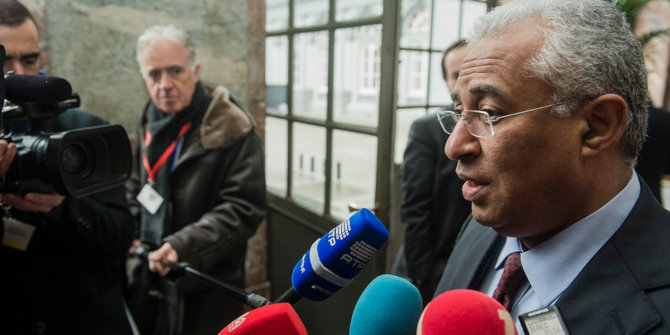The principle of ‘differentiated integration’ allows some EU member states to pursue closer integration in specified areas without the participation of all member states. However, while differentiated integration has allowed the integration process to make advances that would not otherwise be possible, it also raises important questions about fairness. Drawing on a new book, Richard Bellamy, Sandra Kröger and Marta Lorimer set out the normative criteria that differentiated integration should respect to be considered fair and democratic.
Differentiated integration has become an increasingly familiar form of European integration. As the EU has become bigger and more heterogeneous, allowing some to integrate further while others stay behind has made it possible for EU integration to proceed even when not all member states were willing or able to go forward.
Differentiated integration has potential advantages and disadvantages. It can foster fairer cooperation between EU member states by acknowledging how one size may not fit all, especially when EU member states are so socio-culturally and economically diverse. However, it can also generate unfairness. It could lead to the exclusion of some member states from projects they might have wanted to join. As a result, it might lead to a two-tier EU. It may also be the source of exemptions that make it possible for some member states to free ride on the benefits of European integration without assuming their share of the costs. There are even worries that it be deployed by governments seeking to derogate from abiding by democratic values and fundamental rights.
Our new book, Flexible Europe, identifies the normative criteria that differentiated integration should respect to be considered fair and democratic, and empirically analyses how far political party actors concur with these criteria. In our normative analysis, we argue that differentiated integration should be both substantively and procedurally fair. Substantive fairness relates to social justice and the distribution of the costs and benefits involved in a system of social cooperation – for example, how much people should pay in taxes and what level of social benefits they ought to be entitled to.
We hold that no member state should be excluded from a policy if it would become worse off than it currently is as a result of differentiated integration. A state should also not be allowed to opt out of a policy or be exempted from meeting certain standards if that would render the participating or complying states worse off than they are. Moreover, the conditions governing both exclusions and opt-outs/exemptions should ensure the maintenance of public goods (such as a clean environment) and common resource pools (such as fish stocks) are not eroded as a result.
Procedural fairness relates to issues of fair participation within, and the legitimate exercise of power by, the political institutions of the EU. Fair participation suggests that the process for determining which collective goods are produced or maintained, by whom and how, should treat all those involved impartially and with equal concern and respect.
To ensure that differentiated integration remains procedurally fair, we argue that both exclusions and exemptions should be agreed either unanimously by representatives of all member states when negotiating the accession of new members or amending the Treaties, or result from a member state choosing not to participate in a form of enhanced cooperation agreed to by at least nine member states. Moreover, participants must consult non-participants on the conduct of the policy area, which should remain subject to common Treaty provisions, and provide them the prospect of joining in the future.
Importantly, we insist that no member state should be able to opt out from Article 2 TEU or deny EU citizens their entitlements under the Charter of Fundamental Rights of the European Union. Instead, we suggest that in the shape of ‘value’ differentiated integration, differentiated integration can justify the exclusion of backsliding member states from EU decision-making in the Council and the curtailing of their access to EU funding.
If differentiated integration that meets these standards is to be recognised as fair and legitimate, these criteria must also resonate with political party actors. To analyse their views on these questions, we integrate our normative analysis with an empirical study of how political party actors from across the ideological spectrum in Austria, Denmark, Germany, Greece, Hungary, Portugal and Romania perceive of the fairness of differentiated integration.
Party actors’ views on differentiated integration proved less optimistic than our own assessment. While some regarded it as a pragmatic way forward for the EU, and as potentially respecting the principles of substantive and procedural fairness, others worried about its negative implications for equality and solidarity. Substantively, while many thought that differentiated integration could ensure an equitable distribution of the costs and benefits of European integration, they also worried that it could result in free riding and an abandonment of solidarity between member states.
Procedurally, whereas a small majority of interviewees considered that differentiated integration would not create inequities, a sizeable minority considered that it might do precisely that. To avoid this eventuality, they advocated procedural criteria of fairness similar to those we advanced. For example, they contended differentiated policies must remain open for all to join provided they met certain clear and consensually agreed criteria. They also thought that all member states should have a say on the policy in the Council, though only participating states should be entitled to vote. However, they considered that all MEPs should be able to vote on differentiated policies within the European Parliament.
Finally, political party actors shared concerns that differentiated integration might facilitate democratic backsliding. However, they also concurred with our view that differentiated integration would be unacceptable in areas pertaining to Article 2 and considered that the EU was entitled and able to counter such backsliding.
Party actors’ less than optimistic assessment of differentiated integration highlights the importance of the normative criteria we put forward for a fair model of differentiated integration. Even though some might think that the UK leaving the EU will make differentiated integration a thing of the past, Brexit is unlikely to spell the end of this mechanism. The EU remains a heterogeneous union. Flexibility and differentiated integration are likely to persist as crucial if the EU is to unite its diverse parts democratically and fairly. Our book shows why and how that might be best achieved.
For more information, see the authors’ new book, Flexible Europe: Differentiated Integration, Fairness, and Democracy (Bristol University Press, 2022)
Note: This article gives the views of the authors, not the position of EUROPP – European Politics and Policy or the London School of Economics. Featured image credit: CC-BY-4.0: © European Union 2022 – Source: EP




